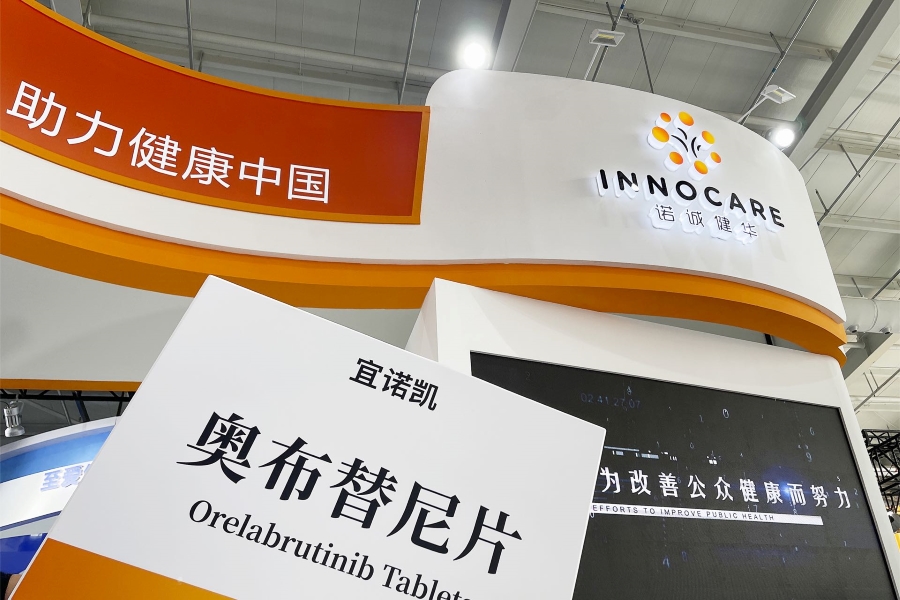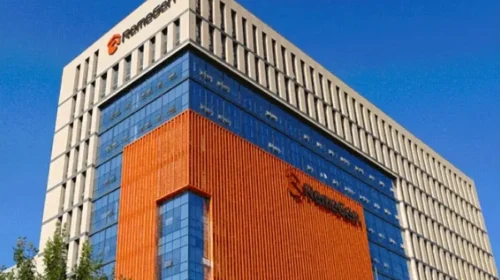Losses Mount at InnoCare but Cash Cushion Dulls the Pain

The cancer drug developer logged another loss in the latest quarter but a cash pile of more than 9.2 billion yuan can sustain its business for the next five years
Key Takeaways:
- InnoCare’s drug sales soared after its key product was approved for Chinese medical insurance coverage, but hefty foreign exchange losses pushed the accounts into the red
- The company raised nearly 3 billion yuan on Shanghai’s STAR Market in September, putting it in a comfortable cash position for now
By Molly Wen
China’s InnoCare Pharma Ltd. (9969.HK; 688428.SH) has just logged another quarter of losses in a tough season for the cash-hungry biomedical sector, but investors and analysts seem undeterred by the continuing flow of red ink.
So how has the cancer drug maker managed to keep the market on side?
With a weak Hong Kong stock market, unprofitable biomedical companies have seen their valuations slashed this year and have struggled to refinance in the secondary market. Drug innovators rely on a constant stream of cash and many of the Hong Kong-listed firms have had to halt development pipelines, close industrial bases or lay off workers to save money.
It has not been easy for the Hong Kong-listed biotechs to top up their funds through secondary listings on Shanghai’s Nasdaq-style STAR Market. Very few of the unprofitable firms can meet a key criteria set by the STAR Market: a valuation of over 20 billion yuan ($2.8 billion). Even InnoCare Pharma,which completed its Shanghai listing in September, has seen its Hong Kong valuation shrink by half in a year, barely crossing the qualification threshold.
But the company managed to secure its STAR listing before winter really set in, raising 2.93 billion yuan to tide it over tough times. Its earnings report released on Sunday showed that the company could call on more than 9.2 billion yuan in cash and cash equivalents by the end of the third quarter.
On Nov. 14 Chairman and CEO Cui Jisong told investors on a conference call that the company had enough cash to bankroll its development pipelines and commercialization efforts for the next five years, which could go a long way to ensuring high-quality outcomes. The confident assertion, in contrast to the woes of financially struggling peers, did the trick in reassuring long-term investors.
The day after the earnings report, InnoCare stock opened 2.65% higher and continued to climb, ending the day with a gain of 11.55%. Helped by a rally in the overall market, the stock enjoyed a three-day winning streak with a cumulative rise of 17.4%.
Strong sales of key products
Aside from the cash cushion, investors were also cheered by the company’s revenue performance. In the first three quarters of 2022, its total revenue reached 442 million yuan, including 400 million yuan in drug sales, up 129% from the year-earlier period. Sales jumped when the company’s key product, a cancer drug called Orelabrutinib, made it onto a list of treatments covered by state medical insurance. The product is one of a growing number of so-called BTK inhibitors, which block the growth of tumors without the use of chemotherapy.
Orelabrutinib gained regulatory approval in December 2020 and is used to treat several types of cancers such as relapsed or refractory chronic lymphocytic leukemia (CLL), small lymphocytic lymphoma (SLL) and mantle cell lymphoma (MCL). By late 2021 it had been adopted by the national healthcare insurance system. Despite a limited number of approved uses, the product has been outpacing sales of other drugs in the same category, including Zanubrutinib made by BeiGene (BGNE.US; 6160.HK; 688235.SH). Sales of the BeiGene drug in mainland China rose nearly 12% to 270 million yuan in the third quarter from the previous three months.
InnoCare is looking to expand the use of Orelabrutinib. It has applied for the drug to be approved for other conditions including relapsed or refractory Waldenström’s macroglobulinaemia and marginal zone lymphoma (MZL). In overseas markets, the drug is about to be approved for marketing in Singapore for mantle cell lymphoma and has entered Phase Two of U.S. clinical trials for treating the same disease.
The company’s revenues fell 55% over the three quarters, largely due to a licensing deal for Orelabrutinib with the U.S. biotech company Biogen that brought in 776 million yuan in the same period last year. Discounting this factor, the company’s revenue grew 88% in the third quarter and by 115% over the nine months.
R&D expenses soar 30%
The company has also found favor with several investment banks, such as CMB International, Guotai Junan Securities and CITIC Securities. All three have awarded the stock “overweight” ratings. CITIC Securities highlighted a jump in drug sales since insurance approval was granted, as well as the company’s efforts to expand the drug scope and progress towards commercialization goals. The investment bank believes that the core drug will be approved for further conditions and that other development pipelines will bear fruit in the coming year, all positive for the share price.
The company continues to pour money into developing cutting-edge drugs, investing 475 million yuan in R&D over the nine months. On paper, the sum was 117 million yuan lower than in the same period in 2021, mainly due to a licensing down payment to Incyte Corporation that was logged last year as R&D outlay. That aside, R&D expenses in the three quarters grew 30% to support a growing number of clinical projects both at home and abroad.
The R&D spending also pushed the company deeper into the red. InnoCare posted a net loss of 393 million yuan in the third quarter alone, up 232% from the year-ago period. And its net loss for the nine months jumped more than nine times to 834 million yuan. The company cited the strong dollar as a factor as well as rising R&D spending. It said unrealized foreign exchange losses of 399 million yuan in the nine-month period did not affect the company’s day-to-day operations.
In terms of valuation, the company has drawn strength in a feeble market from the reputation of its founder, Shi Yigong, in the field of innovative drug development. If its nine-month revenue is extrapolated to the full year, the company’s price-to-sales (P/S) ratio could reach 33 times, far higher than BeiGene’s 15.7 times and the 14.2 times for Innovent Biologics (1801.HK).
As the Hong Kong market picks up, investors may begin to focus on whether the company’s research pipeline can deliver more winning formulas to sustain InnoCare’s price premium and growth momentum.
To subscribe to Bamboo Works weekly free newsletter, click here






